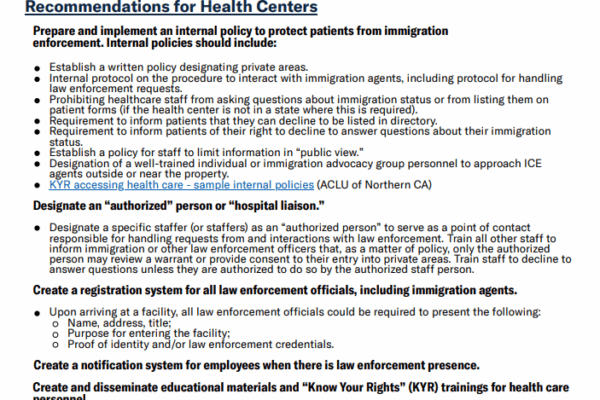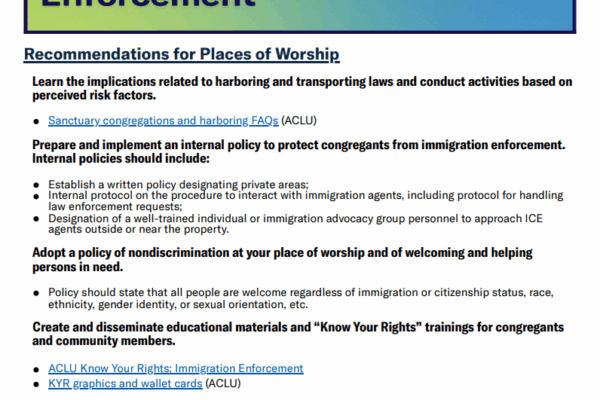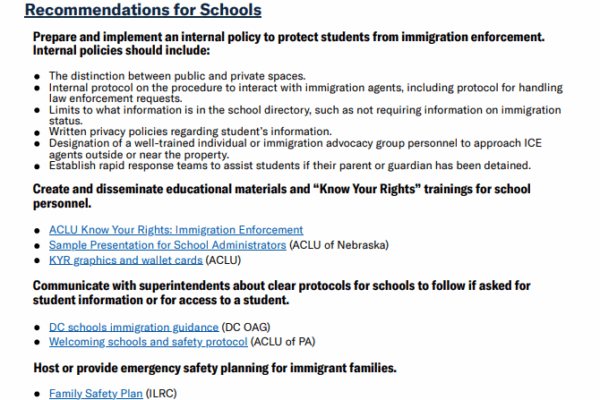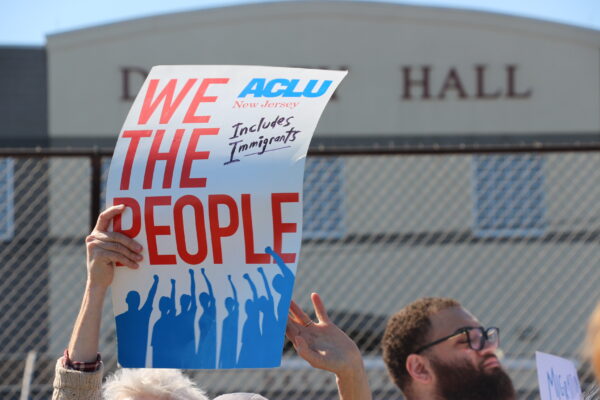Remain calm. Do not run.
If you’re stopped by Immigration and Customs Enforcement (ICE), you may ask them “Am I free to leave?” If they say yes, you have the right to calmly walk away.
You can ask agents to show you their badges and identify themselves. ICE agents sometimes wear uniforms that say "Police" even though they are not police officers; it can be important to confirm what agency the officers work for. In addition to ICE, certain other federal law enforcement agencies have also participated in immigration enforcement.
You have the right to remain silent, even if the officer has a warrant. Anything you say – including your name, the country in which you were born, your immigration status, or your criminal history – can be used against you in immigration proceedings.
Do not physically resist or reach for your belongings without permission, even if you think ICE officials are acting unfairly or unlawfully.
You have the right to say no to searches of your car, house, phone, or person. You cannot lawfully be arrested for refusing to consent to a search. However, ICE may search you if they are placing you under arrest, or they may search your home or car if they have a valid search warrant signed by a judge. Learn more about the differences between valid judicial warrants and administrative warrants here.
If you are not under arrest, you have the right to photograph or film ICE activity in public so long as you do not physically interfere or otherwise obstruct ICE operations. If you have a right to be somewhere, you can record from there.
If an agent asks you for immigration documents, what you need to provide depends on your immigration status:
- U.S. citizens do not have to carry proof of citizenship if they are in the United States. However, presenting proof of citizenship may help to resolve an encounter with ICE.
- If you have valid, unexpired immigration documents and are over the age of 18, the law requires that you carry those documents with you.
- If you are not sure about what documents your immigration status requires you to carry, you may wish to consult with an attorney to get advice on whether the law requires you to carry immigration documents and on whether it is a good idea to carry any additional documents.
- If you have lived in the United States for at least two years, you may wish to carry with you documents that prove this fact. Certain noncitizens who have been in the United States for fewer than two years may be at risk of fast-track deportations.
- You have the right to remain silent even if the officer asks questions, and even if you do not present documents.
Never lie or present fake or fraudulent documents. Be aware that identification documents from a foreign country (like a foreign passport) or expired U.S. immigration documents can be used against you in immigration proceedings.
ICE cannot lawfully hold you unless they have reason to think you are in the country without authorization or have violated an immigration-related criminal law. Race or ethnicity alone are not valid reasons to stop you.
Make a plan ahead of time with family and friends in case you are ever arrested by ICE. Memorize important phone numbers and make emergency plans with people you trust.
If you are arrested by ICE:
- You have the right to remain silent.
- You have the right to ask to speak with a lawyer.
- You have the right to refuse to sign documents.
What You Can Do If You Feel Your Rights Have Been Violated
Sometimes federal immigration officials detain, search, or arrest people in violation of their rights. If this happens to you, or if there is a federal immigration raid, write down everything as soon as possible, including any identifying information about the officers and their vehicles. If injured, seek medical attention and take photos.
If you were arrested or have experienced misconduct by federal immigration agents, contact a lawyer as soon as possible. While the ACLU-NJ does not make attorney referrals, you can find a list of free and low-cost deportation defense providers here or by calling the Legal Services of New Jersey Hotline at 1-888-LSNJ-LAW, or you can contact a private immigration attorney.
You can also contact the ACLU-NJ here to report potential constitutional violations.
Note About Local Law Enforcement
New Jersey state and local police officers generally may not participate in immigration enforcement, with some exceptions. You can learn about New Jersey’s Immigrant Trust Directive here.
The information on this page is general in nature and does not constitute legal advice. Consult an attorney for legal advice. Produced and distributed as a free public service by the American Civil Liberties Union of New Jersey Foundation, a non-partisan, nonprofit civil rights advocacy group.
Related Content

Guidance for Health Centers on Immigration Enforcement

Guidance for Places of Worship on Immigration Enforcement

Guidance for Schools on Immigration Enforcement

Cruelty at Delaney Hall Is Yet More Proof of the Trump Administration’s Horrific Immigration Agenda
Stay Informed
Sign up to be the first to hear about how to take action.
By completing this form, I agree to receive occasional emails per the terms of the ACLU’s privacy statement.
By completing this form, I agree to receive occasional emails per the terms of the ACLU’s privacy statement.

